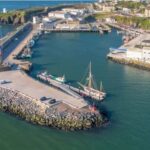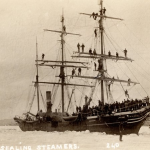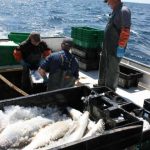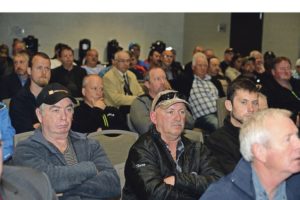Daily Archives: October 15, 2012
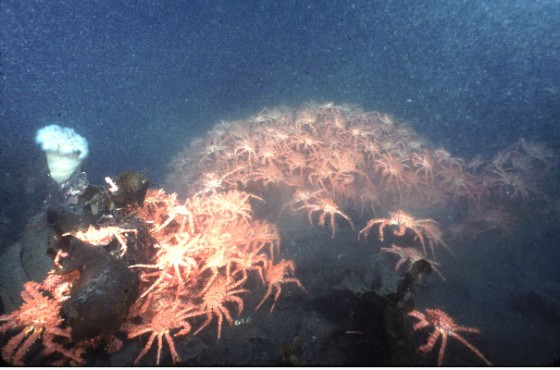
Red king crab quota holding steady, snow crab down for 2012-13 Cordova Times
Commercial fishermen heading out Oct. 15 and beyond for the 2012-13 Bristol Bay red king crab harvest will have a quota of 7.85 million pounds, up slightly over the 2011-2012 quota of 7.834 million pounds. The Bering Sea snow crab quota, however, is down from 88.894 million pounds a year ago, to 66.35 million pounds for the upcoming season. The Alaska Department of Fish and Game announced the current season’s quota for red king crab on Oct. 3, with 7,067,700 pounds of individual fishing quota and 785,300 pounds for community development quota. http://www.thecordovatimes.com/article/1241red-king-crab-quota-holding-steady-snow-crab
Ripples from disruptions in the fishing industry will reach a long way By DON CUDDY
They say bad news comes in threes, and that seems to be the case in the New Bedford fishing industry these days. On top of a recent declaration from the secretary of commerce that the groundifsh industry in New England is a national disaster, the scallop fleet is looking at catch reductions of 30 percent for the next two years. And groudfishermen are resigned to more drastic cuts to their quota for the next fishing year, which begins on May 1.
Frustration over the cuts is mounting on the waterfront because fishermen have their doubts about the accuracy of NOAA’s stock assessments.
“There’s more yellowtail now than there were in the ’60s,” said Reidar Bendiksen of Reidar’s Manufacturing in Fairhaven, a family business that makes trawl gear. “But the fishermen can’t go where they are, and they are not allowed to catch them.”
http://www.southcoasttoday.com/apps/pbcs.dll/article?AID=/20121014/NEWS/210140346
Cape Cod’s fishermen fret over seals, dogfish and the future
Two areas, 35-miles south and 150-miles east of Chatham have been closed for cod and other groundfish but the National Marine Fisheries Service is contemplating re-opening to help fishermen because all fishermen are facing drastic cuts of 70 percent in cod and 73 percent in haddock on Georges Bank. But not all fishermen are enthused.
Then there’s this insight by someone who can’t be very smart.
Wholesaler Andy Baler of the Nantucket Fish Company noted that huge mid-water trawlers are catching tons of herring off shore while the National Marine Fisheries Service looks idly on. “Cod and haddock feed on local herring but they’re starving. That’s why you see fish so skinny,” he said. “The mid-water trawlers are going to suck every bit of bait out there. You have one management system for some fish and another management system that goes and kills all the fish they eat.” Bullard conceded the two plans are un-connected. NOAA takes a fish by fish approach. “This port is crushed. We’re living on a few dogfish,” Baler declared. “We need some help. Keep the herring here so we can fish the channel.”
Read more: Cape Cod’s fishermen fret over seals, dogfish and the future – – Harwich Oracle http://www.wickedlocal.com/brewster/newsnow/x1826353094/Cape-Cods-fishermen-fret-over-seals-dogfish-and-the-future#ixzz29O2eBrZ9
The relationship is this. The larvae of the bottom fish need to go to the surface of the ocean in order to obtain food – plankton – and light. While they go up, they become a feast for the pelagics. When those larvae that survive become codlThe relationship is this. The larvae of the bottom fish need to go to the surface of the ocean in order to obtain food – plankton – and light. While they go up, they become a feast for the pelagics. When those larvae that survive become codlings, they want to go back to their friends and relatives. While they descend to their native habitat, they become a second feast for the pelagics.
http://carmine3.newsvine.com/_news/2010/11/04/5408211-fish-and-future



































